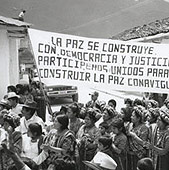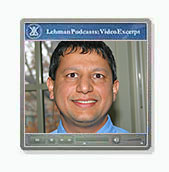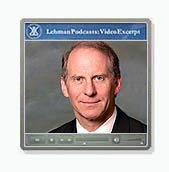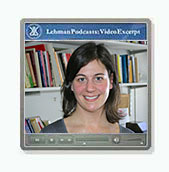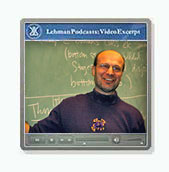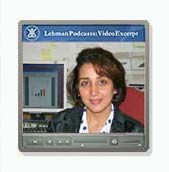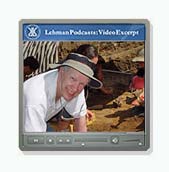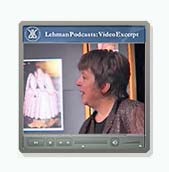Genocide in Guatemala
// April 10, 2008
The term "genocide" makes most of us think of the Holocaust during WWII, or the slaughter that took place a decade ago in Rwanda, or the situation today in Darfur. Closer to home, though—in the Central American country of Guatemala—more than 200,000 people were killed or disappeared during the 1980s.

Science for You: How Might Global Warming Threaten the World's Water Supply?
// August 23, 2007
With the pressures of a growing population and the effects of global climate change, scientists predict that fresh water will be a limited resource in the near future. In this podcast, Hari K. Pant, a professor in Lehman's Environmental, Geographic and Geological Sciences Department, forecasts the future of the world's water supply in an age of global warming and explains the effects of a potential water shortage in regions around the world, including the United States.

Council on Foreign Relations President Dr. Richard Haass Delivers Annual Lehman Lecture
// April 19, 2007
Dr. Richard N. Haass, President of the Council on Foreign Relations, addressed the College community at the annual Lehman Lecture yesterday. In his talk, titled "The United States and the Greater Middle East," Dr. Haass discussed the foreign relations challenges currently facing the United States, including the war in Iraq; Iran's current political climate; Israel's relations with the Palestinians and Syrians; the struggle for the future of Lebanon, and the domestic and social challenges facing the hundreds of millions of people who live in the Arab world.
Prior to his work at the Council, Dr. Haass was Director of Policy Planning for the U.S. Department of State, where he was a principal advisor to Secretary of State Colin Powell on a broad range of foreign policy concerns. Confirmed by the U.S. Senate to hold the rank of ambassador, Dr. Haass served as U.S. Coordinator for policy toward the future of Afghanistan and was the lead U.S. Government official in support of the Northern Ireland peace process. For his efforts, he received the State Department's Distinguished Honor Award.

Science for You:
How Could Plants Help Treat Human Diseases?
// March 19, 2007
Dominick Basile is a professor in Lehman's Department of Biological Sciences. His research focuses on the origin and development of plant forms and structures. In this interview, Professor Basile discusses a concept called place-dependent suppression--why fish have scales, but humans don't, for example. He theorizes that interfering with the normal patterns of plant development might uncover how developmental capabilities in human beings could likewise be changed.

Appetite of the Metropolis
// February 11, 2007
How did New York City become the world-renowned restaurant town that it is today? From open air markets to free-standing restaurants to short-order cooking, Assistant Professor Cindy R. Lobel of the History Department explains why the manner in which New Yorkers got their food had such a great impact on the social and political lives of New Yorkers as far back as the eighteenth century. Professor Lobel is currently at work revising her dissertation for publication under the proposed title The Appetite of the Metropolis: Food, Eating, and the Rise of a Consumer Culture in New York City, 1750-1870.

Science for You: What Do Math and Music Have in Common?
// December 12, 2006
After a successful career as a jazz pianist, which included recordings and performances throughout North America, Europe and Japan, Dr. Robert Schneiderman joins the Lehman Mathematics and Computer Science faculty. In this interview, he talks about connections between the two fields. To listen to his jazz compositions, visit www.robschneiderman.com.

Science for You: The Chemistry of Human Bonds
// November 1, 2006
Professor Maryam Bamshad is a lecturer in the Department of Biological Sciences. Her research focuses on how chemicals in the brain play a role in monogamous mating systems and parental behavior. In this interview she addresses the importance of parental bonding.

Exploring the Roots of Jazz
// November 1, 2006
In his talk on the roots of jazz music, Distinguished Lecturer Bob Stewart (Music) transports us back to New Orleans' Congo Square in the 1800s and then forward to New York's contemporary jazz scene. In this excerpt, he talks about how the peaceful atmosphere in 1860s New Orleans contributed to the creation of jazz.
Science For You: What Were Your Ancestors Like?
// October 2, 2006
Professor Eric Delson is chair of the Anthropology Department at Lehman College. He is also a research associate in the Department of Vertabrate Paleontology at the Museum of Natural History and the Director of the New York Consortium in Evolutionary Primatology. His areas of expertise include paleontology and evolution of humans, apes, and Old World monkeys. For more information on Professor Delson, visit www.nycep.org/ed.
Elizabethan Fashion and Costumes
// October 2, 2006
Professor Susan Soetaert of the Department of Journalism, Communication and Theatre gave a talk on Elizabethan fashion and costumes September 18 in conjunction with exhibition "Elizabeth I: Ruler and Legend." This national traveling exhibition, on view at the Library until October 6, commemorates the 400th anniversary of the death of England's Queen Elizabeth.
![]()
Last reviewed on: 4/23/2009
